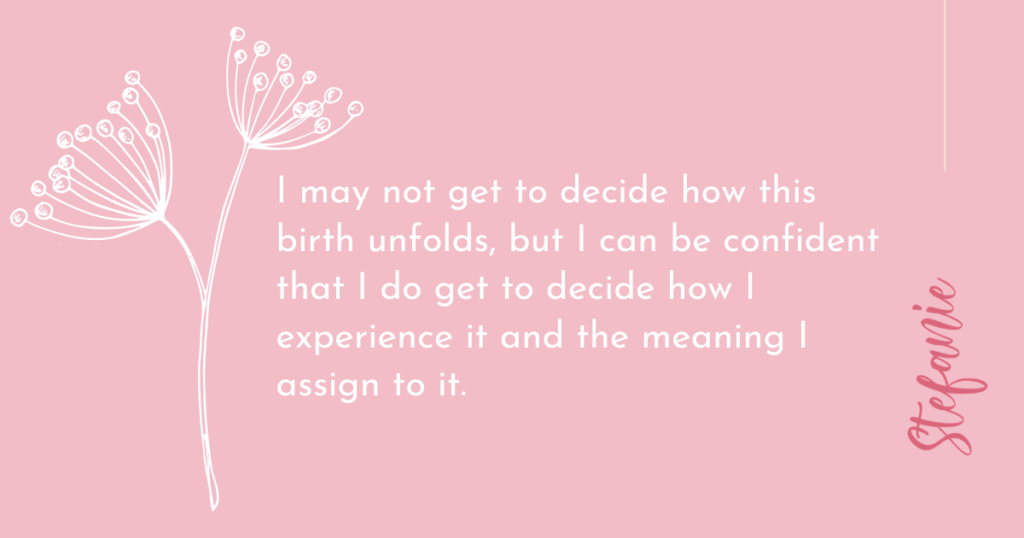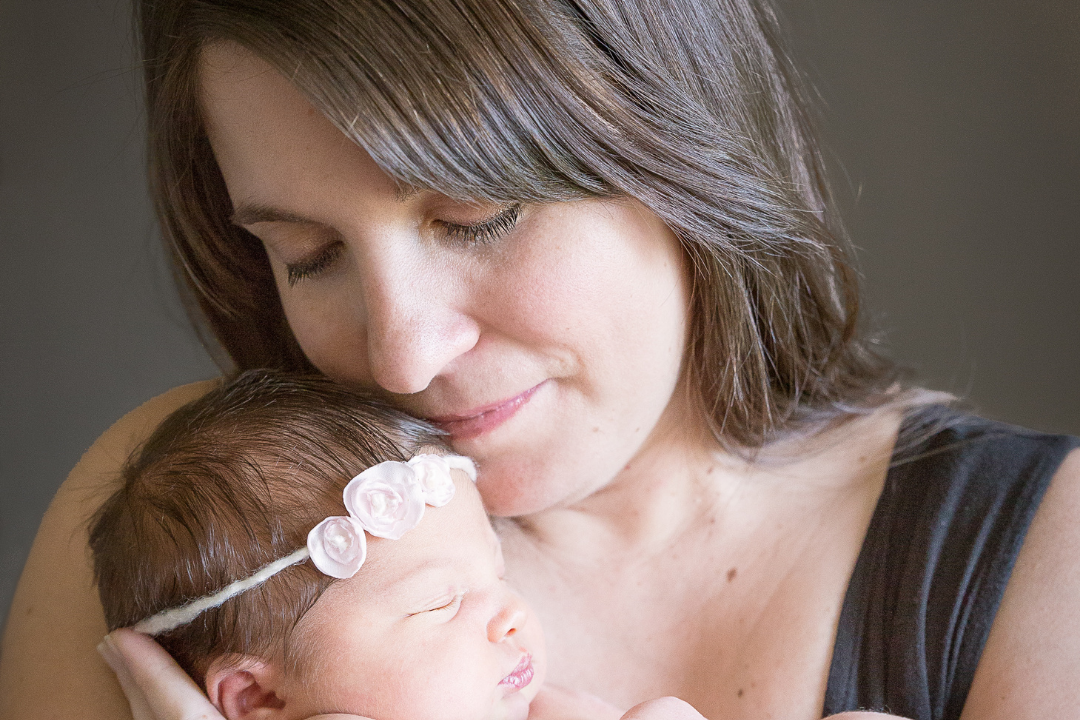Birth is like a symphony; it’s a variety of factors—a woman’s hormones, her brain, her organs, the baby’s position, and more—that all come together to bring our baby into the world.
Many of these factors are somewhat out of our control. We can certainly take measures to influence our birth events toward positive outcomes. Our culture often encourages us to create a “birth plan,” which is usually a set of very specific guidelines the mother wishes for her birth. These can be things like whether we want medication during labor, who we want present in the room, how we want the atmosphere of the room to be (lighting, noise), how much medical intervention we want, etc.
There’s nothing wrong with having preferences or hopes for our birth experience. In fact, it’s not a bad idea to think through these factors ahead of time so what is most important to us becomes a priority during our birthing experience. But when we are so focused on outcomes only (like most birth plans are) it’s possible to fall into the trap of becoming wedded to a particular “birth plan” or outcomes.
It’s easy to forget, when we become outcome-focused, that birth rarely goes exactly according to plan. And when this happens, we might be setting ourselves up for disappointment or worse, feelings of failure, if the outcomes we had in mind aren’t met. So how do we plan for victorious birth without focusing too much on outcomes? Let’s take a look at some practical, healthy steps to take when planning for birth.

It Starts with the Mind
Birth is a monumental experience in a woman’s life, and it can shape her for years to come. One study showed that how women interpret and assign meaning to their birth experiences is just as important as the actual birth events themselves. This means that it’s not just how our birth unfolds that matters, but perhaps what matters more is the lens we view our birth events through.
One study shows that even in births that are supposedly “normal,” women report feelings of failure related to their performance during birth. So we have to ask the question whether it’s the actual events that mainly influence how we feel about our births or is another factor involved? Could it be that our focus on a certain outcome during birth puts performance pressure on a mom during labor and delivery?
The mindset that we approach birth with is vitally important. We can approach our labor and delivery with a “birth plan” and some positive beliefs such as “My body was designed for birth and knows just what to do.” These are good, but I think they fall short because of the focus on outcomes alone. What happens if the birth doesn’t go according to plan? Or what if the main outcomes are met, but a woman still comes away feeling like her performance was a failure?
I can personally attest to this. My preference was to have an unmedicated home birth and I did manage to do so. What I didn’t realize at the time was how much I wanted to be in a good mental space during labor and delivery. And I desired to be aware of God’s presence during the process. After my water broke when active labor began, I had intense lower back pain or back labor. It was a constant, stabbing pain that never let up until I gave birth. The labor was happening relatively fast, and we forgot options like counter-pressure to help with the pain.
Despite position changes, the back labor persisted. And that, in combination with lack of sleep since I was up all night in early labor, made for a rough combination. My mind was brimming with negative thoughts, I whined about my back pain a lot and can barely remember my husband being there or God’s presence during that time. I was just miserable. So even though my desired outcome of an unmedicated home birth happened, I still came away with feelings of failure about my performance.
I’ve since realized a mindset shift is required for a better experience. I decided to approach my latest birth by shifting my focus away from the events and outcomes I may not be able to control.
Choosing Trust
This decision was truly challenged as I found out I had gestational diabetes at the beginning of my third trimester. Suddenly the uncomplicated, low-risk birth I’d been planning to have at a birth center with certified nurse midwives was on the brink of being transferred to hospital care if I wasn’t able to get my fasting blood sugar numbers within a certain range.
I managed to control my blood sugar after meals fairly quickly using dietary changes and lots of exercise. But fasting blood sugar numbers are affected by a variety of factors, some of which are completely out of our control. I spent weeks doing the very best I could to set myself up for good fasting numbers. But I must admit, when it came time to test my blood sugar each morning, there was some dread. Too many numbers above a certain range and it meant I’d have to start insulin and be transferred to hospital care. And just because I could keep the numbers within a certain range at the beginning didn’t mean that couldn’t change later, as some women become more insulin resistant as pregnancy progresses.

This meant the plan for where, and possibly how, I give birth could change suddenly. To a certain extent, there is only so much a mom can do to control her fasting blood sugars. Sometimes she’s done everything she can and still needs medical management. Being on insulin could mean needing growth ultrasounds, more monitoring of potential complications, and possibly needing to be induced at 39 weeks, which is often what happens with moms who have gestational diabetes that need medical management.
This was a far cry from the birth I was envisioning. I had been hoping and praying for a redemptive birth experience this time—one where I could be much more in tune with God’s presence and experience less suffering in pain compared to my first birth.
As I was wrestling with all of this, I thought of the very message I’d written a few weeks earlier in this article. I could feel my beliefs being challenged. Did I still believe God could meet me in a beautiful, redemptive birth even if it meant giving birth in a hospital during a COVID-19 pandemic? Did I still believe I could experience God’s best for me even if I needed insulin and more medical management?
Ultimately, I’ve had to surrender my desires, hopes and wishes for this birth and TRUST that God will be present and at work no matter what. I’ve had to hone in on how I will experience and interpret my birth through the mindset I’m bringing to it. I may not get to decide how this birth unfolds, but I can be confident that I do get to decide how I experience it and the meaning I assign to it.
The Victorious Birth Mindset
That’s why a “victorious birth” mindset is so powerful. A victorious birth mindset begins by saying you can’t fail at birth. There is no wrong way to give birth; and every birth deserves to be celebrated. We aren’t victorious or celebrated for how our birth events take place. We are victorious and celebrated because we are partnering with God to bring life into the world. And so our focus shifts from having events play out a certain way to partnering with God and experiencing His presence in the midst of it, no matter how the circumstances go.

A victorious birth mindset trades a focus on outcomes and our performance for an approach grounded in God’s presence and His truth. Our courage and strength aren’t measured by our birth events, but instead, they are part of our God-given identity. It takes an immense amount of courage and strength to trust God with our birth experiences. We have an opportunity to choose to trust His ability to bring beauty and redemption out of our birth events no matter what happens. These truths allow us to approach our birth with flexibility, which is crucial. We can let go of a rigid plan and instead approach birth with an open hand that includes our preferences. But the priority is experiencing God’s presence and being grounded in His truth over our lives.
You can learn more about how to have a victorious birth mindset through an upcoming e-course “Victorious Birth,” which I collaborated on with my friend Jenny Donnelly. It will be released later this year. We also talk about a preliminary step to developing a victorious birth mindset, which is exchanging our fears for God’s truth. Join me in the next article of this series on victorious birth, where I’ll share a snapshot of how to overcome fear and tap into a victorious birth mindset.


